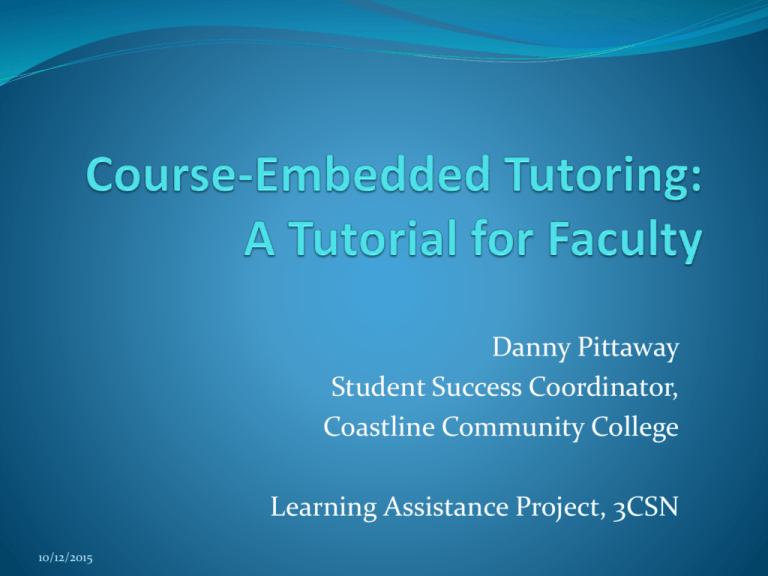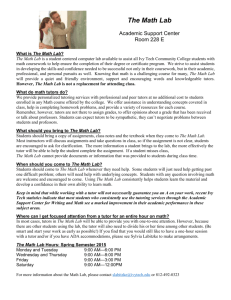Course-Embedded Tutoring - Coastline Community College
advertisement

Danny Pittaway Student Success Coordinator, Coastline Community College Learning Assistance Project, 3CSN 10/12/2015 Student Success Department Provides learning assistance to all students to enhance student achievement Annual budget of $400,000 (general funds + grants) Serves 2,000+ students annually across five campuses (LJC, NBC, GGC, CC, and ECHS), in specific course sections, and online 1 full-time faculty member; 1.5 permanent assistants, 3 hourly assistants 60+ tutors who are hourly employees The Tutors Many tutors are current Coastline students. Many are students at local 4-year or graduate-level institutions (e.g., CSUF, UCI, CSULB). Tutors are at-will hourly employees who earn $15.43 per hour. Tutors complete tutor training (EDUC C101) typically in the first term of employment. A typical tutor assignment is 12 hours per week to work in a Success Center while supporting one or two online courses as an embedded tutor. Other tutors split time between onsite course embedded support and presence in the Success Center for drop-in tutoring. EDUC C101: Tutor TRAINING • Online Course, half unit, 8 weeks • Discussion Forum and final paper • DOLPHIN • Introduction to current andragogy: • • • • Reading Apprenticeship Habits of Mind Growth Mindset Grit Tutors as professional educators A look back, a look forward In fall 2011, there was one Student Success Center (LJC) that served a few hundred students annually The center at that time focused on basic skills English and math. Today, we serve all students across all disciplines, and tutors are trained through EDUC C101: Tutor Training Tutors specialize in writing, math, science, or accounting, but can assist any student with basic study skills and how to approach any class for success Reading Activity 1. Please read the article. (10 minutes) 2. Highlight one or two “golden lines” that resonate with you as you read. 3. Share with a partner. 4. Share with the group. 1. 2. 3. 4. 5. Principles Tutors are educational professionals. Training should be rigorous, practical, and sustainable. Instructors and tutors have different yet equitable roles. Tutoring is about student empowerment. Tutoring contributes to student success. 1. Tutors are educational professionals. Learning Assistance Domain Zone of Proximal Development Middle ground between novice and expert Novice Domain Learning Assistance Domain Expert Domain 3. Instructors and tutors have different yet equitable roles. Both occupy the instructional domain Tutors can focus on study skills and learning strategies Together, teachers and tutors have a powerful impact A teacher may be like the team coach; a tutor may be like a personal trainer. 4. Tutoring is about student empowerment. Growth mindset GRIT Successful Habits of Mind DOLPHIN (Dream, Organize, Learn, Persist, Have a plan, Innovate, Never give up) All students can benefit from tutoring Course-Embedded Tutoring Effective Practices The instructor is like the coach of the team (class), and the tutor is like a personal trainer for each player (student) on the team. The tutor is not a teaching assistant; tutors assist students in learning Tutors may never grade anything or have access to grades Instructor and tutor should communicate often to establish a working rhythm Course-Embedded Tutoring Versus Supplemental Instruction Course-Embedded Tutoring Supplemental Instruction •Tutor has a presence in the class and attends, whether onsite or online •SI Leader has a presence in the class and attends, whether onsite or online •Tutor likely also works in the local Success Center on campus for drop-in tutoring •SI Leader prepares and conducts a regular review session and invites students to attend (not mandatory) •Most common in English and math •Most common in the biological sciences Master/Apprentice As an instructor, consider yourself a master. A tutor embedded in your course is like an apprentice. Many of us (instructors) started our careers as tutors. Tutors develop empathy, communication and problem-solving skills that will assist them in their development as educators. Faculty Expectations Assist in the promotion of instructor and student surveys and encouraging students to give feedback about the service Establish good working relationship with tutor based on clear communication Respond or request in a timely fashion to assist our department in setting things up Participate in regular training sessions and other opportunities for professional learning related to tutoring / learning assistance How/What Mapping On a piece of paper, respond to the following questions: Think about a class you teach. What assignments or procedures do students struggle with? Do your students prepare well for your assignments? Do students turn things in on time? Do you believe that your students do not apply effective study strategies/habits? What spaces exist that could be filled by a tutor? In thinking about yourself as the content expert and the tutor as a learning assistance specialist, in what ways can you position a tutor to help your students? Next Steps Look for email sent on behalf of the Student Success Department (usually Nicky Rehnberg or me) on requesting an embedded tutor. We have a form for requests. Contact nrehnberg@coastline.edu or dpittaway@coastline.edu if you would like to work with a course-embedded tutor in a future term. Student Success Coordinator Daniel S. Pittaway, M.S. Ed. dpittaway@coastline.edu My primary office is at Le-Jao (Westminster). 714-241-6184 x17419 Email is the best way to reach me.




